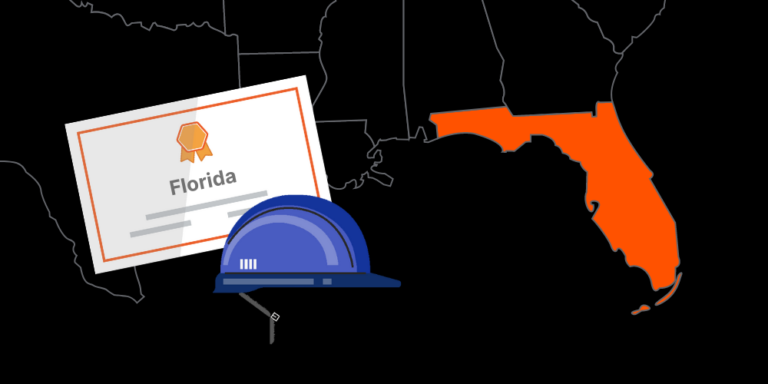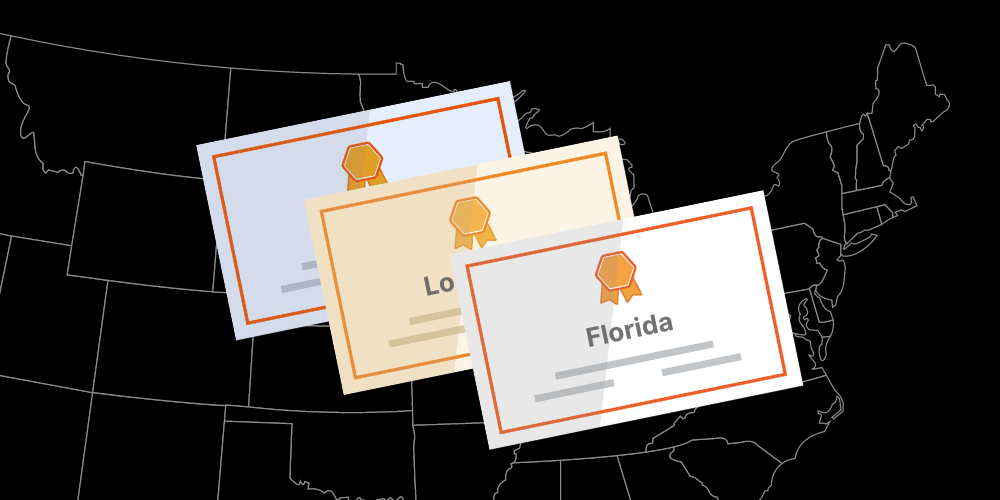— 7 min read
Florida Contractor Licensing Guide

Last Updated Jan 30, 2025

Tom Scalisi
Contributing Writer
59 articles
Tom Scalisi is a writer with over 15 years of experience in the trades. He is passionate about educating contractors and specialty contractors about the best practices in the industry. He has seen first-hand how education, communication, and preparation help construction professionals overcome challenges to build a strong career and thriving business in the industry.
Last Updated Jan 30, 2025

If you're getting a construction business started in Florida, knowing the proper licensing and registration rules is a key first step — Florida has very specific requirements for contractor licensing. Florida has both registries and certifications, which go through the same department but use different application processes. One allows you to work in a local area, while the other will enable you to work statewide — yet they both require you to pass the same written tests.
The Florida contractor license process is governed by the Construction Industry Licensing Board (CILB) within the Department of Business and Professional Regulation (DBPR). They provide applications for both certified licenses that enable statewide contracting as well as registered licenses that are limited to particular cities or counties.
Note: As of July 1, 2021, Florida HB 735 prohibits local governments from regulating licenses that do not correspond with trades already laid out by state agencies like the CILB and DBPR. Though some exceptions have been made for local governments that were previously issuing licenses, these exceptions expire July 1, 2023. As a result, contractors should refer to their county and city agencies to determine whether a local license is currently required.
Keep reading to learn about the different types of contractor licenses in Florida as well as how to obtain one.
Table of contents
How to get a contractor license in Florida
Registered licenses for specific areas
If you only want to work in a localized area, you can get by with a registered license. These licenses are provided by the Florida Construction Industry Licensing Board, and they apply to both general contractors and specialty trades.
There are several different applications to choose from, including:
- Air conditioning
- Building
- General
- Glass and glazing
- Mechanical
- Plumbing
- Pool/spa
- Precision tank tester
- Residential
- Roofing
- Sheet metal
- Specialty
- Tank lining applicator
- Underground utility and excavation
Before you apply for any of these licenses, there are a few requirements that you must meet.
First and foremost, you must receive a Certificate of Competency issued after taking a test before applying for registration.
You’ll also need:
- Fingerprints
- Proof of financial stability and decent credit
- Proof of public liability and property damage insurance as well as a workers' compensation insurance policy or an exemption
- Be 18 years of age
- Pay the fees required by each individual application
Registered general contractors use this application, and the fee is either $205 or $305, depending on the year you apply (see application for full details).
Plumbing contractors will use this application, and the fee is similarly either $205 or $305 dependent on the application timeframe.
Other trades will have to find their applicable applications through the CILB website.
Courses about construction.
For construction.
Unlock your career potential with our free educational courses on Health & Safety, Data in Construction, and more.
Certified licenses for statewide certification
Contractors that wish to work statewide will have to go through the CILB for a certified license. Again, this applies to general contractors and specialty trades, and each has its own license to apply for.
There are several certified licenses to apply for, and they include:
- Air conditioning
- Building
- General
- Glass and glazing
- Mechanical
- Plumbing
- Pollutant storage system
- Pool/spa
- Residential
- Roofing
- Sheet metal
- Underground utility and excavation
Again, the CILB has certain requirements that you must meet, and they include:
- Passing a licensure exam for a certified contractor
- Four years of experience or a combination of college and experience
- Financial stability and decent credit
- Fingerprints
- Pay any applicable fees
- Be 18 years of age
- Proof of public liability and property damage insurance as well as a workers' compensation insurance policy or an exemption
General contractors will fill out this application, and the fee ranges between $145 and $245, depending on the time of year you apply (see application for full details).
Plumbing contractors will fill out this application, and the fees, again, range between $145 and $245.
All other subcontractors will have to find their application through the CILB website.
Electrical contractors
Remember how we said licensing in Florida could get confusing? Well, electrical licensing is no different. Contractors looking for electrical licenses in Florida will still have to choose between registering and certifying, and both are still handled under the CILB.
However, there’s an extra layer: The Electrical Contractor Licensing Board. But the process doesn’t change all that much.
Both registered and certified contractors can apply for the following licenses:
- Alarm System I
- Alarm System II
- Electrical
- Specialty
Electrical contractors looking for a registered license will apply using this application, and fees include $151 for initial registration and $25 for additional counties (payable one time, not once for each county).
Electrical contractors interested in applying for certified licenses will use this application, and the fee is $263.65. Both license types require the applicant to pass an examination, as well.
Learn the rules in nearby states:
Florida's handyman exception
Florida statutes do provide an exception for “basic handyman services.” There is no limit to the contract amount, but it does limit the types of services you can provide.
For example, to fall under this exception, you cannot work on:
- Foundations
- Structural walls
- Plumbing
- Electrical
- Asbestos abatement
- Other tasks that specifically require licenses
If you aren't performing the work described above, you might not need a Florida contractor's license. However, you still need to acquire a business license in order to operate your business.
Keep in mind, although the “handyman exception” allows you to perform work not included for state licensing purposes, there are some counties that will still require a license. For instance, Lee County requires painters to get a license to perform work in the county. So make sure to check your county license board to be certain whether you need an additional license or not.
Performing a Florida contractor license search
By performing a Florida contractor license search, everyone on a job can be sure that they're working with a reputable contractor. Considering it only takes one bad contractor to force an owner to double-pay or leave a sub or supplier unpaid, it's probably worth double-checking.
Luckily, the Department of Business & Professional Regulation makes it easy to perform a Florida contractor license search and verify the license status of a contractor. The website also makes it easy to lodge complaints. For those contractors looking to get licensed, the site also provides an opportunity to apply for a license online.
Penalties for unlicensed construction work in Florida
The State of Florida takes unlicensed contract work very seriously. A first offense is considered a first-degree misdemeanor, which can mean up to a year of jail time or probation. If you commit any further offenses (or if you perform unlicensed work during a declared state of emergency), the state considers it a third-degree felony, upping the jail time or probation to five years. You are also subjecting yourself to civil penalties of up to $10,000.
In addition to the penalties and fees, you may also lose many rights as well. First off, any contract (performed or not) is automatically unenforceable by law or by equity. That means you can't force someone to honor your contract, and you can't look to a legal tool such as unjust enrichment to recover payment. Also, any lien or bond claims/rights that you may have had are gone as well. If you did get paid for unlicensed work, you're still not out of the clear: If a contractor performs work deemed faulty or defective while unlicensed, a court can award treble (that means triple) damages to the property owner. Plus, the court can also force them to return any money paid under the contract.
Additional resources
Licensing and application requirements can get complicated. A helpful resource comes straight from the Florida Department of Business and Professional Regulation (DBPR) website. They have a great support function where more nuanced questions can be asked, and answers can be searched by keywords.
As of 2020, Florida allows out-of-state contractors from a select few states to apply for license reciprocity if licensed for at least 10 years in their own state.
Was this article helpful?
Thank you for your submission.
91%
9%
You voted that this article was . Was this a mistake? If so, change your vote
Scroll less, learn more about construction.
Subscribe to The Blueprint, Procore’s construction newsletter, to get content from industry experts delivered straight to your inbox.
By clicking this button, you agree to our Privacy Notice and Terms of Service.
Thank you!
You’re signed up to receive The Blueprint newsletter from Procore. You can unsubscribe at any time.
Categories:
Written by

Tom Scalisi
Contributing Writer
59 articles
Tom Scalisi is a writer with over 15 years of experience in the trades. He is passionate about educating contractors and specialty contractors about the best practices in the industry. He has seen first-hand how education, communication, and preparation help construction professionals overcome challenges to build a strong career and thriving business in the industry.
View profileExplore more helpful resources

Contractor License Bonds: Everything You Need to Know
In order to perform construction work, many states require contractors to be “licensed and bonded.” What does that mean? Well, every state sets its own rules for contractor licensing, and...

Contractor’s Guide to License Reciprocity: Working Across State Lines
For many contractors, growing a construction business means taking on jobs in different states. Whether it’s to take a one-off project or to establish a new business location, working in...

Vermont Contractor License: Guide to Rules & Requirements
If you’re starting a construction business in Vermont or looking to expand your business from another state, being properly licensed to work is one of the first key steps. There...

The Maine Contractor License: Guide to Rules & Requirements
If you’re considering starting a contracting business in Maine, it’s important to know the rules and requirements for proper licensing. Maine takes a different approach to contractor licensing than most...
Free Tools
Calculators
Use our calculators to estimate the cost of construction materials for your next project.
Templates
Find a template to help you with your construction project tasks.
Material Price Tracker
Get the latest U.S. retail prices and view historical trends for common building materials.
Glossary
Explore key terms and phrases used in the industry.
